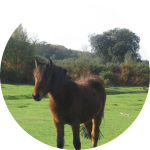| Home |
Welcome to the Horse Stall |
|
Horse Stall contains all types of information for Horse Lovers.
There are a number of products branded horse gifts and products.
Horse Articles :: Horse Breeds Glossary - B Continued
|
Horse Breeds Glossary - B Continued |
|
BASOTHO PONY Found in a South African enclave called Lesotha, the Basotho Pony is primarily used as a riding horse. Developed after 1825, the Basotho Pony is an offspring of the Cape Horse. Crossing with other horses such as the Thoroughbred and Arab breeds and exportation caused a near extinction of the Basotho Pony in the early part of the twentieth century. In the late twentieth century, efforts to strengthen the breed once more was strong thanks to the formation of the breed society. The Basotho Pony is well-know for its distinctive gaits, not only with the canter, trot, and walk, but also the pace and the triple. The Basotho Pony was responsible for the development of the Nooitgedacht Pony. BELGIAN HORSE The Belgian - A History A native to Belgium, the Belgian horse is derived from the fertile land and thrifty farmers that Belgium is well-known for. The powerful, heavy Belgian feeds on the hearty grain, hay, and pastures in the Belgium area. A European country, Belgium is in the heart, which makes it a prime breeding spot for the great horses known as Flemish horses. Medieval writers dubbed these horses as such because they were in the center of battles carrying armored knights. These horses were also in existence during Caesars ruling. Flemish horses were directly responsible for all draft breeds of the modern day. Exported to various European areas, stallions were used to breed draft type horses of the larger kind, these were typically used for farming and industrial areas. Belgium was not one of the areas needing imports. In fact, this is the ancestral home and the only one to date for the Flemish horses. The Belgium government was at the forefront of maintain the genetic material of the great horse. They organized and created the Brussels national show, in which generous prizes were given for breed winners. Belgium began to treasure these draft horses and in 1891, the government beings of Autria, France, Germany, Italy, and Russia made use of these horses. The Belgians became a very large financial aspect for many breeders. In early 1887, in a town in Indiana, the American Association was created. Still in existence today, this association was responsible for the promotion of many breeds of horses which includes the Belgian, Shire, Clydesdale, and Percheron. The Belgians were the subject of an exhibit, placed by the Belgium government, in the World Fair held in St. Louis in 1903. The popularity of the breed soared from that day forward. In 1910 registrations soared to 1773. In 1913, the records were the same, memberships continued to grow on a yearly basis as new breeders were established, this was until World War I began. In 1914, at the start of the war, imports were stopped. This left all Belgian breeds to fend for themselves, which was not altogether bad, since they were able to create Belgian horses of their own styles. For several years during the depression Purebred Belgians were rare, however, in 1925 the numbers began to increase once again with record setting registrations. In 1937, more than 3,000 Belgians were registered. The Belgians stayed strong in the 20's and early part of
the 30's, while other breeds were on a decline. This created
the need for importations, which even on a small scale, was
a big step in the post war years. For many more years, it
was a time of great ups and downs for both imports and the
Belgian breed. As the years went by, there were down times
off and on. However, eventually the breed once again picked
up and began movements and registrations once again. About the Author |
Top Horses |
|
| Top Horse Movies | |
Horse Resources |
|
Horse Health |
|
Horse Breeds |
|
More Horses |
|


| Copyright 2005-2021 DR Management All rights reserved |
Dog Gifts | Wildlife Gifts | Handmade Horse Gifts |
